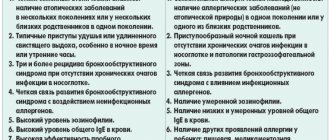In some cases, night cough appears due to poor sleep hygiene, however, if this symptom bothers the patient frequently, it may be associated with a number of serious disorders, for example, obstructive sleep apnea syndrome, a dangerous disease that can cause numerous complications. Therefore, despite the fact that cough itself does not bring the same significant discomfort to the patient as, for example, pain or night suffocation, its cause must be detected and eliminated.
Are you bothered by a night cough? Contact our Center and we will help you effectively! Make an appointment by phone: +7.
Why does my cough get worse at night?
When a person is in a horizontal position, mucus accumulates in the nasopharynx and the airways are not cleared. When you have a runny nose, discharge from the nose and paranasal sinuses flows into the throat and causes a cough reflex, so the cough is painful during sleep, especially when we roll over from side to side, and in the morning when we get out of bed.
Dust and dry air can worsen a cough. This is especially true in apartments with central heating. Dry and hot air irritates the mucous membranes and provokes coughing attacks. To alleviate your condition, regularly ventilate the bedroom and do wet cleaning. It would be a good idea to buy an air humidifier. But if you don’t have one, and you need to fight a cough right now, you can hang a damp towel on the radiator or place a container of water next to the bed.
Dry cough
A dry cough originates in the upper respiratory tract. It comes in fits and starts - often unpredictable and uncontrollable. The process is accompanied by a “barking” sound. However, the attacks do not bring relief.
The cause of a dry cough can be inflammation of the throat mucosa and soreness. However, a prolonged cough only irritates the mucous membrane more, forming a “vicious circle.” Also, a dry cough occurs when the bronchi do not secrete enough mucus to effectively remove germs from the body.
If you have a severe and prolonged dry cough due to a cold, your doctor may recommend a drug that stops the cough reflex (Omnitus, Sinekod). And to facilitate the discharge of sputum, special means that stimulate expectoration (Bronchicum TP, Gerbion, licorice root syrup) may be recommended.
With proper diagnosis and treatment, the dry cough is replaced by a wet one, the infection and germs are removed from the body along with sputum, and the inflammation goes away.
Dry and wet cough - is there a difference?
Eat. The wet cough associated with colds and flu is useful for clearing the nasopharynx and airways. Phlegm protects the mucous membranes and prevents bacteria from entering the body.
A dry, scratchy cough, on the contrary, is quite dangerous for the body. With such a cough, sputum is not released, the bronchi are not cleared, and the nasopharynx dries out. A constant inflammatory process is maintained on the walls of the respiratory tract. A dry cough, unlike a wet one, does not help you recover, but only exhausts you and prevents you from resting. To speed up the healing process, you need to try to convert a dry cough into a wet one. But this should be done under the supervision of a doctor.
Causes of cough
Cough can be acute, subacute and chronic. An acute cough lasts less than 3 weeks and is usually caused by viral and other infections. The disease often begins with a dry cough, which subsequently develops into a wet cough with sputum production. Subacute cough lasts from 3 to 8 weeks, this symptom may persist after the end of the underlying illness (for example, a respiratory viral infection or influenza). Chronic cough lasts more than 8 weeks (more than 4 weeks in children) and may be associated with postnasal drip (an inflammatory process in which mucous drains down the back of the throat into the airways), gastroesophageal reflux disease, bronchial asthma, interstitial lung diseases, chronic obstructive pulmonary disease (COPD) and others.
In children, cough most often occurs with colds, flu, false croup, bronchiolitis, and whooping cough.
Causes of acute cough include:
- upper respiratory tract infections (colds, flu, laryngitis, sinusitis, whooping cough);
- lower respiratory tract infections (acute bronchitis, pneumonia);
- coronavirus infection (COVID-19);
- exacerbation of a chronic disease (bronchial asthma, chronic obstructive pulmonary disease, chronic bronchitis);
- inhalation of dust, smoke, chemicals.
Causes of chronic cough include:
- Chronical bronchitis;
- bronchial asthma;
- allergies (allergic rhinitis, hay fever);
- smoking;
- bronchiectasis;
- gastroesophageal reflux disease (GERD);
- tuberculosis;
- heart failure;
- lungs' cancer;
- emphysema;
- sarcoidosis;
- cystic fibrosis (in children);
- certain medications (ACE inhibitors prescribed to treat heart failure and hypertension).
Is a child’s night cough dangerous?
No, unless the cough is a symptom of a serious illness (such as asthma or pneumonia). The most common cause of cough in children is a viral infection. Viruses infect the respiratory tract at different levels - from the nose to the bronchi, bronchioles and lungs. Sometimes the cough continues for several weeks because the child does not have time to recover from one infection and catches another. About 10% of children continue to cough even after ARVI has been treated.
Some doctors even propose to introduce a new term - “post-viral cough”. Such long attacks frighten parents, but most often they do not indicate serious pathologies.
But even if the illness is not dangerous or has completely disappeared, it is difficult for the child to endure sleepless nights, especially with a dry cough. And parents have a hard time if they don’t know how to help.
Important: if a child often coughs at night, this may be a sign of respiratory tract pathology, allergies or whooping cough. Be sure to consult a doctor and do not treat your child yourself, so as not to worsen his condition.
Cough
Cough is perhaps the most common problem that parents encounter. Very often, a cough, even if it sounds scary, has a harmless cause and goes away on its own. Sometimes a cough is a serious symptom. Let's try to figure out how to behave when a child develops a cough and when to start sounding the alarm.
What is a cough?
Coughing is a manifestation of a protective reflex that is designed to clear the airways. During a cough, air abruptly leaves the lungs and forces out everything that interferes with breathing - phlegm and foreign bodies. If you think about the mechanism of coughing, it becomes clear that it does not always need to be “suppressed”.
What causes a cough and what is it like?
The most common cause of cough is a viral infection. Viruses can cause damage to the respiratory tract at different levels - from the nose (with a common runny nose) to the bronchi, bronchioles and lungs, and cough is a common symptom in all these diseases. For example, inflammation of the throat and nasal discharge flowing down the back of the throat irritate the mucous membrane of the upper respiratory tract and stimulate the cough reflex. Due to irritation of the mucous membrane of the pharynx, a dry hacking cough occurs, which will certainly go away without treatment, but in the acute period it can be quite frequent and painful and even disturb night sleep. A runny nose and discharge along the back of the throat provoke a wet cough, and the child begins to cough when changing body position, especially in the morning and at night, when he gets up, lies down or turns over. If the virus infects the mucous membrane of the larynx, false croup develops, that is, swelling and, as a result, narrowing of the lumen of the larynx, which is accompanied by a “barking” cough, hoarseness and a characteristic noisy inhalation (the so-called stridor). With inflammation of the bronchi, bronchioles and alveoli - bronchitis, bronchiolitis and pneumonia, respectively - sputum accumulates in the lumen of the respiratory tract, swelling of the mucous membrane occurs, resulting in cough and shortness of breath. Unlike viral bronchitis and bronchiolitis, pneumonia is more often caused by bacteria and, in addition to cough and shortness of breath, is accompanied by fever. In bronchial asthma, spasm of the bronchi and the accumulation of thick sputum in them occurs after contact with an allergen, which also provokes a cough.
When should you call an ambulance for a child with a cough?
It is necessary to call an ambulance if the child, along with a cough, has the following signs:
- it is very difficult for the child to breathe: you see that the child is breathing with difficulty, it is difficult for him to speak (or scream if we are talking about an infant) due to difficulty breathing, the child has “groaning” or “moaning” breathing;
- the child lost consciousness and/or stopped breathing;
- The child's lips turned blue.
If there are no severe symptoms, but the child’s condition is concerning, consult a doctor. An important sign of trouble is the child's appearance - if he is lethargic, looks sick and if you cannot attract his attention and catch his eye. Dyspnea, that is, rapid breathing, accompanied by effort of the respiratory muscles and retraction of the intercostal spaces and the jugular fossa (the depression above the sternum) is a sign that indicates damage to the lower respiratory tract. If you notice shortness of breath in your child, be sure to consult a doctor. An increase in body temperature, especially a fever above 39 - 40 ° C, also requires that the child be examined by a doctor, since cough and fever can be symptoms of pneumonia.
Special attention should be paid to children in the first months of life, because in young children, serious illnesses can progress silently, and the condition can worsen suddenly. In case of fever (that is, if the child's rectal temperature is > 38 ° C) in children under three months of age, you should definitely consult a doctor.
Should yellow or greenish color of sputum be alarming?
Yellow or green sputum does not always indicate a bacterial infection. In viral bronchitis and bronchiolitis, the yellow-green color of sputum is due to the fact that cells from the mucous membrane of the respiratory tract, which has been damaged by the virus, enter the sputum. As new mucous membrane forms, the sloughed cells are expelled with sputum, so there is no need to be alarmed if your child coughs up yellow or even greenish sputum, as in most cases this is a normal manifestation of a viral infection and does not require antibiotics.
What to do if your child coughs at night?
Most often, night cough is due to the fact that when the child lies in bed, discharge from the nose and paranasal sinuses flows into the throat and causes a cough reflex. When a child turns over in bed or gets up from a horizontal to a vertical position, a coughing attack occurs. In such cases, the doctor will prescribe local treatment for the child to reduce the runny nose and, as a result, reduce the cough.
Night cough also occurs with pathology of the lower respiratory tract. Therefore, if your child is bothered by a cough at night, consult a doctor.
What to do if a child coughs to the point of vomiting?
If your child has a persistent cough that leads to vomiting, contact your pediatrician, as this may be a symptom of whooping cough. Whooping cough is especially dangerous for children in the first months of life. Sometimes whooping cough develops even in children who have been vaccinated against it, but a lot of time has passed since the last revaccination.
Prolonged cough
Often the cause of a prolonged cough is several successive viral infections. The child does not have time to recover from one infection and picks up another. In this case, the cough can last for several weeks and greatly frighten parents, although its cause is trivial.
However, a prolonged cough can be associated with allergies, including bronchial asthma, as well as whooping cough and other diseases of the respiratory tract and ENT organs (a chronic cough can even be due to wax plugs in the ears!), so in case of prolonged cough consult your doctor.
How to treat a cough?
Cough can have many causes, and treatment is different in each case. Take your child to the doctor to understand what is causing the cough and how to help your child.
If the cough is accompanied by sputum production (wet, productive cough), sputum production should be stimulated to facilitate coughing. Give your child more to drink (for example, you can give apple juice or warm chicken broth if age appropriate and if there is no allergy to these products). If the air in your child's bedroom is dry, install a humidifier.
You can combat a nonproductive (dry) cough by reducing irritation of the upper respiratory tract. To soften the cough and calm the airways, give your child water or apple juice to drink, this also helps with a coughing attack. Avoid giving carbonated or citrus drinks as they may irritate inflamed mucous membranes. If your child tolerates honey, try giving it. Children over 6 years old can suck on cough drops. If your cough interferes with your sleep, going to kindergarten or school, consult a doctor and he will prescribe an antitussive.
Steam in the bathroom can help with a coughing attack. Go into the bathroom, close the door, turn on the hot shower and wait a few minutes. After the bathroom is filled with steam, go in there with your child and sit for about 20 minutes. Try reading a book or playing with your child to distract him.
Smoking at home is strictly prohibited! This contributes to frequent respiratory infections in the child and aggravates their course.
Medicines such as antibiotics and inhalations with bronchodilators, anti-inflammatory and mucolytic drugs are prescribed only by a doctor and are not required in every case.
What to do if a child coughs and cannot sleep?
To quickly stop an attack of night cough and help your child, you can:
- Place a high pillow under the back and turn the child from back to side to prevent a strong outflow of mucus swallowed and accumulated during the day.
- If the child does not have allergies, a spoonful of honey will help - it envelops and soothes the mucous membranes of the throat.
- To soften the cough and calm the airways, give your child warm tea or water to drink. It is better not to drink carbonated drinks or citrus juices - they can further irritate already inflamed mucous membranes.
Sleep hygiene as a cause of night cough
Hygiene in the bedroom must be observed daily, since any deviations from the norm can provoke not only an annoying cough at night, but also other symptoms. The room must maintain optimal humidity. Dry air dries out the mucous membrane of the respiratory tract, thereby irritating it and causing an unpleasant cough. The bedroom must be regularly wet cleaned and ventilated. The accumulation of dust, which also negatively affects the respiratory tract, is unacceptable. Too low a room temperature is also unfavorable for the body. In addition, you need to be responsible when choosing bedding, which should be clean and have comfortable bases for a lying position.
How to stop a night cough in an adult?
Try to find a comfortable position. Place a high pillow under your back. Drink warm tea or water to soothe your throat. This is especially important for dry coughs - the liquid will help soothe the irritation.
If you have trouble breathing, ventilate your bedroom and try humidifying the air. If you don't have a humidifier, hang a couple of wet towels over the radiator. You can arrange a short steam therapy session: go into the bathroom, close the door, turn on the hot water and wait a few minutes.
What medications will help get rid of a cough?
Treating a cough only with folk remedies is ineffective and dangerous. If it does not go away within a few days and nights, be sure to consult a doctor. It is important to remember that cough is a symptom of a disease, and not an independent disease, and therefore complex treatment is required.
A wet cough is treated with mucolytic and expectorant drugs. They improve the removal of phlegm and mucus. But with a dry cough, such medications do not help, but only intensify the attacks, because the body will try to remove phlegm that is not there. Antitussive drugs that inhibit or suppress the cough reflex help get rid of a dry cough.
Mucolytic drugs, which include, for example, ambroxol, will help cope with a wet cough due to bronchitis or pneumonia. The SANTO company produces Ambro® solution, which can be taken orally or inhaled. Ambro® has an anti-inflammatory effect, as well as antioxidant properties, stimulates local immunity, increases the concentration of antibiotics in sputum and bronchial secretions.
What is a cough?
Coughing is a defense mechanism that clears the airways of irritants and germs. It can safely be called a useful reaction of our body: after all, it protects the trachea and bronchi from pathogenic infections and foreign bodies.
Most often, a cough may indicate a cold, but it is important to understand that severe coughing attacks can be symptoms of dangerous processes in the body and serious, and sometimes chronic, diseases. In one case or another, the cough has its own characteristics, and it is its character that helps make an accurate diagnosis. Therefore, it is important to consult a doctor in time to determine the cause of the symptom.











